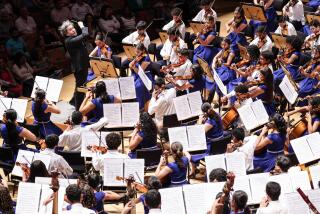‘Salute to Taiwan’ Features 2 Composers
As an ensemble actively pursuing its place in the Pacific Rim, the L.A.-based Asia America Symphony, under its music director Heiichiro Ohyama, presented “Salute to Taiwan” Wednesday night at the Cerritos Center for the Performing Arts. The music of two living Taiwanese composers, both in attendance, was featured.
Heard in its U.S. premiere, the half-hour Symphony No. 3, “Taiwan,” by Gordon Chin (born in 1957), opened the concert. It reveals the composer as a confident master of the Western modernistic large orchestral idiom used for dramatic rather than abstract purposes.
Made up of three movements--”Bereaved,” “Dark Night” and “Ascension”--the symphony is an agitated consideration of Taiwan’s history and future. Its outer movements are pressing and jagged statements: Dueling timpani, aleatoric passages, string glissandos and brass bursts dot the troubled landscape. The middle movement, too, although based on the melody of a Taiwanese song, is unsettled by ominous interruptions. Ohyama and the orchestra gave it a clear and hard-hitting performance.
Prefaced by its composer as “very simple and easy listening,” the “1947” Overture by Tyzen Hsiao (born 1938) was just that: a throwback to the folk-inspired music of such composers as Dvorak and Rimsky-Korsakov. An attractive piece in a naive, sentimental style, the overture is dedicated to the victims of the so-called 2/28 holocaust of 1947. It uses full choir (the Taiwan Great Performers Choir), soprano and piano soloists (Gloria Liu and Melody Kuo), a full orchestra and a Taiwanese folk tune, here set in a typically Romantic vein.
In between, Wu Han stormed Mendelssohn’s Piano Concerto No. 1. Her reading brought nothing particularly new to the familiar work, but it was vivacious and percussively executed. Ohyama and the orchestra supported in the same brash spirit.
More to Read
The biggest entertainment stories
Get our big stories about Hollywood, film, television, music, arts, culture and more right in your inbox as soon as they publish.
You may occasionally receive promotional content from the Los Angeles Times.










